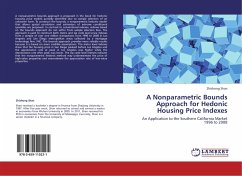
Hedonic Modelling in Land Markets - A Modern Approach
Versandkostenfrei!
Versandfertig in 6-10 Tagen
45,99 €
inkl. MwSt.

PAYBACK Punkte
23 °P sammeln!
This book focuses on the price formanation mechanism in land markets. Several different modern hedonic methods, such as wavelets, local regression and structural time series models, are used to explain and predict land prices in local markets.The book consists of 5 different scientific texts. These articles cover several important hedonic modelling considerations, such as temporal and spatial variability of land prices, model specification dilemma and data sensitivity problem. It is shown how these fundamental hedonic questions can be well addressed through the use of modern hedonic methods.Th...
This book focuses on the price formanation
mechanism in land markets. Several different modern
hedonic methods, such as wavelets, local regression
and structural time series models, are used to
explain and predict land prices in local markets.
The book consists of 5 different scientific texts.
These articles cover several important hedonic
modelling considerations, such as temporal and
spatial variability of land prices, model
specification dilemma and data sensitivity problem.
It is shown how these fundamental hedonic questions
can be well addressed through the use of modern
hedonic methods.
The orientation in this book is on empirical
considerations the underlie the hedonic approach.
The strengths and weaknesses of any particular
hedonic tool are evaluated by their actual
performance on real data sets in land markets.
mechanism in land markets. Several different modern
hedonic methods, such as wavelets, local regression
and structural time series models, are used to
explain and predict land prices in local markets.
The book consists of 5 different scientific texts.
These articles cover several important hedonic
modelling considerations, such as temporal and
spatial variability of land prices, model
specification dilemma and data sensitivity problem.
It is shown how these fundamental hedonic questions
can be well addressed through the use of modern
hedonic methods.
The orientation in this book is on empirical
considerations the underlie the hedonic approach.
The strengths and weaknesses of any particular
hedonic tool are evaluated by their actual
performance on real data sets in land markets.












